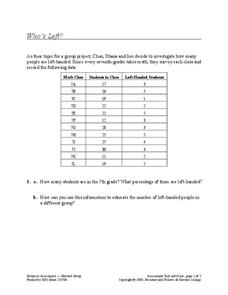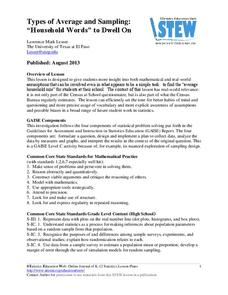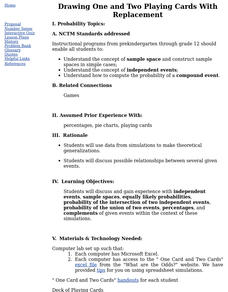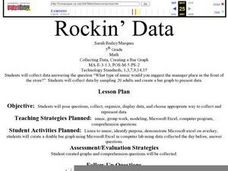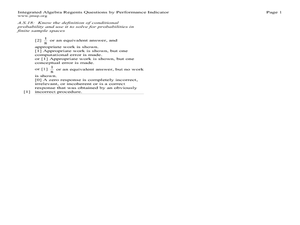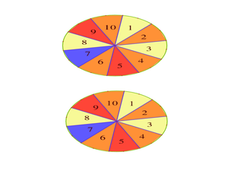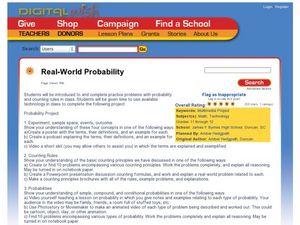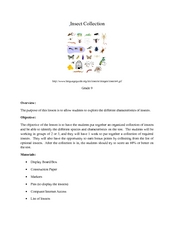Balanced Assessment
Who's Left?
If you're not right-handed, are you wrong-handed? Young statisticians calculate the percentage of left-handed people using a given data set in the assessment task. They plot data on a scatter plot and consider how the line of best fit...
Statistics Education Web
Types of Average Sampling: "Household Words" to Dwell On
Show your classes how different means can represent the same data. Individuals collect household size data and calculate the mean. Pupils learn how handling of the data influences the value of the mean.
Los Angeles County Office of Education
Assessment For The California Mathematics Standards Grade 6
Test your scholars' knowledge of a multitude of concepts with an assessment aligned to the California math standards. Using the exam, class members show what they know about the four operations, positive and negative numbers, statistics...
Curated OER
Practice: Word Problems
Congratulations, you've just hit the word problem jackpot! Covering an incredible range of topics from integers and fractions, to percents, geometry, and much more, this collection of worksheets will keep young mathematicians busy...
Curated OER
Sampling Bias And the California Recall
Using a 2002 California Gray David recall vote as an example, young statisticians identify sources of bias in samples and find ways of reducing and eliminating sampling bias. They consider ways to select random samples from a...
Curated OER
Microfishing
Students use a simple method to collect living microorganisms from natural and/or artificial environments and develop skills in microscopy, observation, drawing, speculation, hypothesizing, oral presentation, and raising questions.
Curated OER
Mark, Recapture, Sampling
Learners conduct a simulation to explore how scientists estimate the size of animal populations. They analyze a random sample and then extrapolate those results to a larger population. Additionally, they will apply the principals of...
Curated OER
Data Analysis, Probability, and Discrete Math
Choose to supplement your probability unit with this resource and you won't be disappointed with the outcome. Teach young mathematicians to organize information using tree diagrams and lists in order to determine the possible outcomes of...
Curated OER
Explorations for the Area Probability Applet
Math whizzes use the area probability applet to manipulate the size of the circle and the rectangle to explore the probability that a point in the rectangle is also in the circle.
Curated OER
Probability - Worksheet
Middle schoolers solve and complete four various types of problems. First, they list all the possible orders completed. Then, pupilscomplete the table and show all the outcomes of throwing a coin and spinning a spinner. They also use a...
Curated OER
Drawing One and Two Playing Cards With Replacement
Math whizzes use data from simulations to make theoretical generalizations and discuss possible relationships between several given events. They use a simple card game to generate data to be analyzed.
Curated OER
Law of Large Numbers - Hospital
Students explore concepts of probability and independent events. They develop a formula for deviation percentage.
Curated OER
Rockin' Data
Fifth graders are given the questions, "What type of music would you suggest the manager place in front of the store?". Students collect data by talking with 20 adults and create a bar graph on the computer to present the data.
Curated OER
Project Conclusion
For this cells worksheet students answer questions regarding the characteristics of living organisms observed during a pond water survey. Students draw diagrams of a food chain.
Curated OER
Integrated Algebra Regents Questions: Conditional Probability
In this conditional probability worksheet, students solve 1 short answer problem. Students determine the probability of selecting an English book given a scenario at the library.
Curated OER
Integrated Algebra Regents Questions: Combinations and Probability
In this combinations and probability worksheet, students solve 3 short answer problems. Students draw tree diagrams to represent possible outcomes in a sample space. Students determine the probability of an event.
Curated OER
Calculating and Applying Basic Probability
Eighth graders investigate the basic concepts of probability. In this probability lesson, 8th graders learn the associated probability. They work with spinners, colored cubes in a bag, flip coins, and choose colored candies while they...
Curated OER
Real-World Probability
Learners explore the concept of probability. For this probability lesson, students create a video, poster, or podcast explaining what experiments, sample space, events, and outcomes are in relation to probability. Learners create a...
Curated OER
Designing a Study
Students explore features to consider when designing a scientific study. For this science research lesson, students examine different methods of data collection and consider which method would be appropriate for determining how many...
Curated OER
Designing A Study
In this designing a study worksheet, students conduct a study on all types of fish that live in the Hudson River. They complete 8 various types of questions that include mostly short answer in response to their findings. Students also...
Curated OER
Designing Samples/Simple Random Samples
Students consider the advantages and disadvantages of various sampling techniques. They define a simple random sample and identify possible sources of bias in other types of samples. Answer Key included.
Curated OER
Insect Monitoring
Students practice the scientific method in the classroom, either in preparation or as a substitution for real-world field experience. They examine a simulated biodiversity research situation, using a "mini-plot" or
sampling square...
Curated OER
How Many Stars in the Milky Way?
Students perform an experiment in which they will use a statistical method called `sampling' to count to a billion (and beyond). Students practice sampling by estimating the number of characters on a page from the classified section of a...
Curated OER
Insect Collection
Students explore how to use several types of insect sampling and collectin equipment. They work in groups to collect insects in different areas of their schoolyard. Students are explained that quadrats are generally used to randomly...


